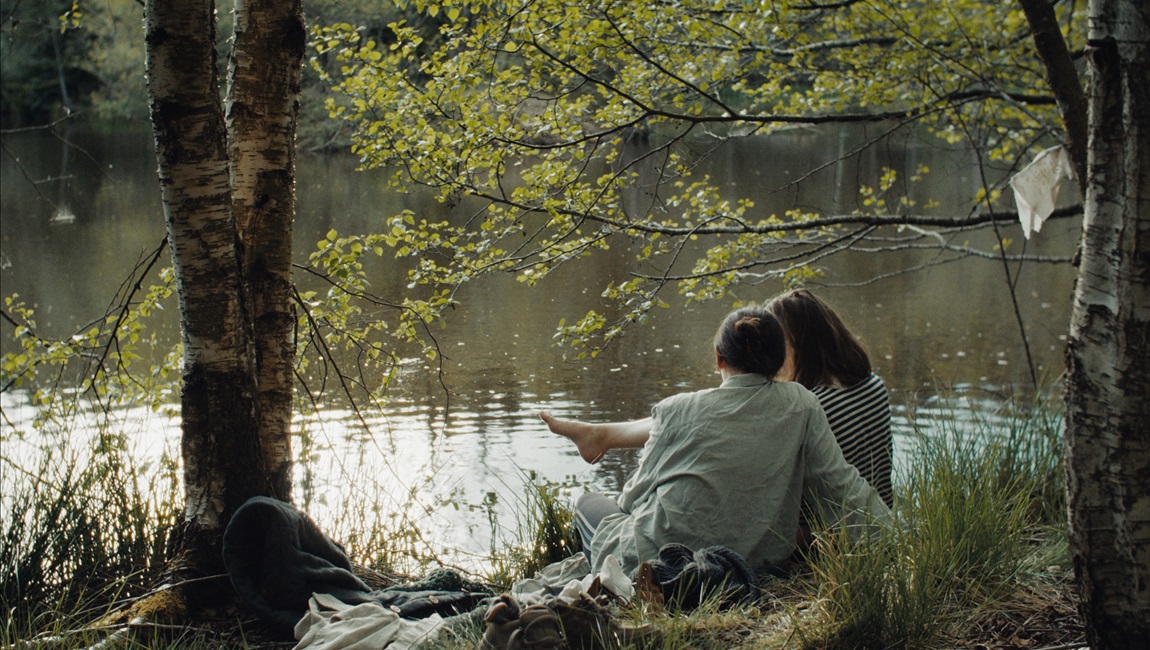In his book Codes For North, filmmaker and film historian Stephen Broomer posits a history of experimental film as an “art that is a contest of difficult pleasures,” a particular kind of formal difficulty “that evolved in tandem with modernism.” The phrase comes to mind while grappling with Katharina Huber’s A Good Place, a sort of speculative sci-fi movie that eschews not only typical genre signposts, but many traditional narrative devices, too. It’s a fragmented, oblique work, one that forces an audience to sit within a certain degree of confusion. Perhaps unsurprisingly, early reviews have not been particularly kind, accusing Huber of art house pretensions and, more specifically, aping some of the formal strategies of Angela Schanelec specifically and The Berlin School in general. But these criticisms don’t account for the “difficult pleasure” of such a work — the confusion and unease is very much part of the point.
Transpiring in a kind of liminal, out-of-time narrative space, A Good Place follows the lives of friends Güte (Clara Schwinning) and Margarita (Céline De Gennaro). They live in a small village, and despite two isolated shots of television sets, there are no other signifiers indicating what year we might be in; there are no cars, no phones (cellular or otherwise), and no Internet. Characters spend much of their time listening to the radio, be it music or, more frequently, the chatter of news programs. Indeed, that constant chatter is almost omnipresent, creating a parallel, contrapuntal narrative that informs and expands upon the accompanying images. Güte seems to live with a revolving series of lovers, while Margarita is in a house with a large, extended family. Everyone seems to subsist entirely on a diet of poultry, and shots of chickens roaming the area, along with shots of coops, eggs, and discarded chicken parts become a sort of cryptic, free-floating symbolism for these people’s meaningless lives. There’s also a mysterious illness that has gripped the land, although it’s unclear if it’s localized or global. Meanwhile, the world prepares for the launch of a rocket ship that is set to explore the furthest reaches of the known solar system. A Good Place is structured as a series of 10 chapters, which count down backwards toward the rocket’s launch date. It’s all very strange, the oppressive mood of aimlessness and the constant threat of potential violence underlined by Huber’s propensity for static, off-kilter compositions and arhythmic editing patterns.
It’s difficult to synopsize an overarching plot here, although the film is packed full of incidents. One chapter details the women’s strange encounter with an older man who exchanges black-market goods and trinkets for sex; another chapter details Güte’s volatile relationship with an angry, emotionally disturbed boyfriend, although he is never mentioned again after his introduction. Various members of Margarita’s family fall ill, but Huber introduces certain narrative threads only to then immediately drop them. The women only mention in passing what has happened to other characters; someone shown to be bedridden in one sequence is later revealed to be dead and cremated. Huber’s insistence on major story beats happening offscreen is downright Bressonian, as is a pivotal sequence where Güte destroys the town’s main chicken coop — an action filmed from oblique angles and abstracted as a blur of motion accompanied by discordant jazz screeching on the soundtrack.
It’s this act of terrorism (or is it civil disobedience?) that forces Güte to flee into the woods and take up with the abusive Wolf (Jannik Mioducki), another angry young man who lives in the woods and frequently erupts into fits of sexual violence. Eventually, after an unknown amount of time has passed, Güte and Wolf return to the village, now largely depopulated thanks to people dying or fleeing. Güte, Margarita, and Wolf take over an abandoned house and seem to be living out some kind of apocalyptic fantasy life, lounging in bathtubs and helping themselves to whatever foodstuffs they can scavenge. It’s unclear why the women stay with Wolf, or why they seem so pleased that the village has collapsed. It’s the end of the world as they know it, but they seem fine. Huber seems interested in some kind of state-of-the-world critique here; it seems relevant that all the voices heard on the radio throughout the film are speaking English while the villagers are all German. The village might be out of place and dislodged from time, but a certain amount of globalization persists regardless. Ultimately, A Good Place seems to be about the ones left behind, an entropy of dissatisfaction at the world ending with a whimper instead of a bang.
Published as part of New Directors/New Films 2024.







